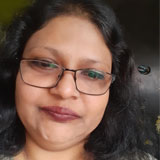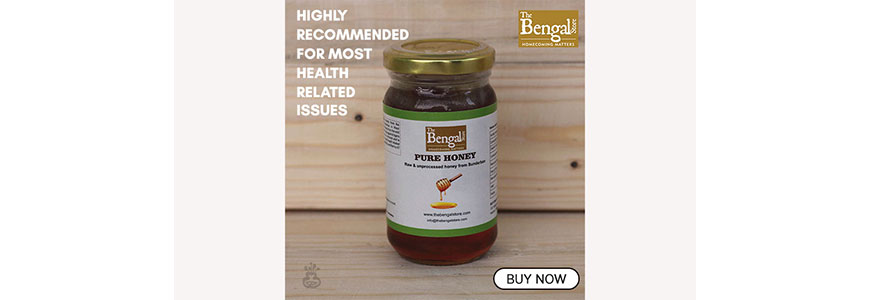‘Pad Crusaders’ who lead Menstrual campaigns in Rural Bengal
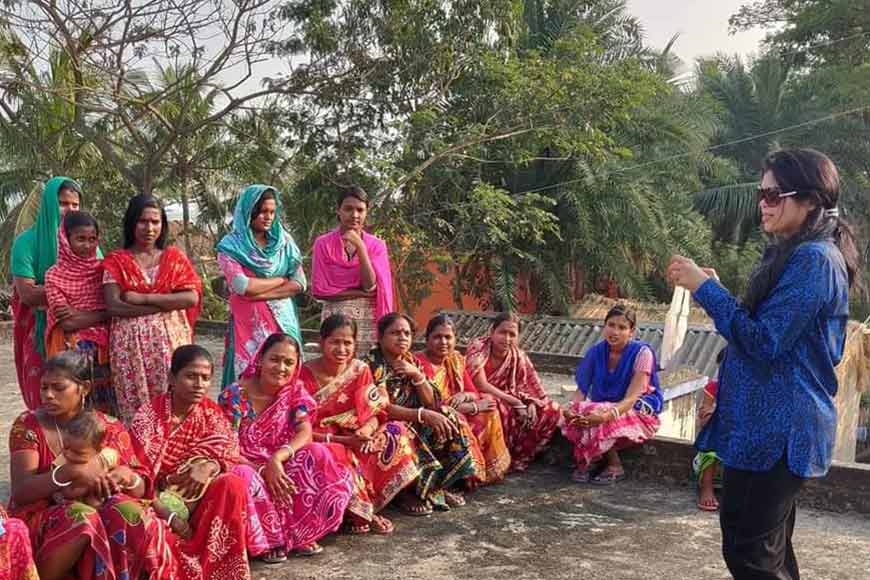
You can call them ‘Pad Crusaders’ or ‘Pad Revolutionaries’. Unravelling the truth behind men-struation in remote Bengal, creating awareness about reproduction and menstruation, hygiene and environmental concerns connected with disposal of sanitary pads to distributing free sanitary pads, that’s what they do. There is an invisible bond between Pragya Gupta and teenaged girl Ivaana C Mitra --- they are both empowering rural women of Bengal with menstrual knowledge.
Pragya, a theatre personality and poet, stepped out of her cozy home amidst pandemic and reached remote villages of coastal Sundarbans, Sagar Island, Chhoto Geokhali, Uttarpara, Birbhum and Kolkata’s slum areas. She along with her group trained women about menstrual health, use of ‘cloth-pads’ and ‘menstrual cups.’ They distributed 50,000 biodegradable and dis-posal sanitary pads, 2,100 reusable cloth pads and 30 menstrual cups in only a few months.
The cloth-pads can be useable for three to four years and are convenient for rural women.
“Volunteers were distributing food and other essentials during Lockdown. I thought of distrib-uting pads, a much-needed essential item. I connected with several local NGOs through social media and hit rural Bengal,” Pragya recollected. She is a volunteer of a People's movement called Padsquad, co-founded by Taranjit Kaur, Chhitra Subramanyam and others in Mumbai. There are 65 Pad Squadders across 32 cities in India. Pragya’s friend and theatre personality Sajal Mondal of Basanti also joined the movement.
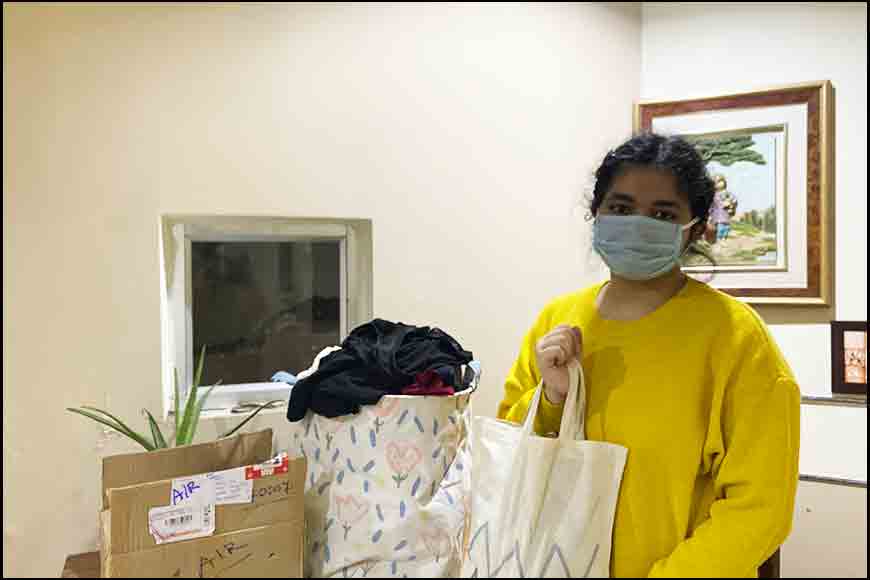 Ivaana C Mitra
Ivaana C Mitra
While a young teenaged girl from Kolkata is striving hard to do a herculean task of distributing sanitary napkins across India. “The idea struck me during the Pandemic and I started contacting people and NGOs through social media. Many have donated clothes for cloth-pads,” Ivaana C. Mitra, a student of Class XI of a well-known school of Kolkata said. She floated an organization, ‘NotApolitical.in’, with her friends in May and have contacted Maharashtra-based organization Paddling Foundation and others to strengthen her work.
Pragya like Ivaana travelled in time of pandemic and worked in rural belts. Distribution of sani-tary napkins, cloth pads, menstrual cups in remote areas were coupled with training about usages and disposal techniques and special awareness sessions. The sessions were to spread the message that women should come out to speak openly about menstruation. “Menstruation is celebration our body and when body tells us that it is ready for reproduction. Periods cannot be linked with feeling dirty as taught by families in rural belts. The menstrual taboos persist and women should not hide it,” Pragya said.
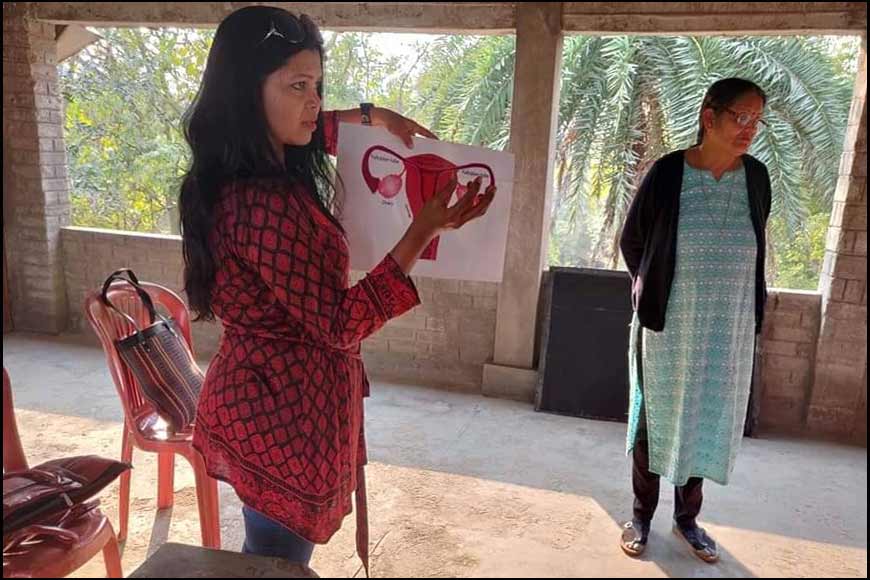 Pragya Gupta demonstrating to the rural mass
Pragya Gupta demonstrating to the rural mass
The cloth-pads can be useable for three to four years and are convenient for rural women. Pragya interacted with young rural girls, who were eager to use menstrual cups as well. “Access to in-ternet has helped these girls to know about the economical menstrual cups. They use napkins though the older generation still stick to clothes. But in many cases, young girls are not aware about the cause of menstruation and related health & hygiene, intervals at which pads should be changed and so on,” she said. That’s where Pragya and her team steps in and also helps rural women stitch them and sell in self-help groups.
Pandemic opened up new vistas for many women and potential in women, help build a menstrual connect between urban-rural women who brought out themselves as new avatars in themselves.
Pragya plans to take forward the ‘pad crusade’ by connecting with rural schools. “In rural schools, there is hardly any education about menstrual health and how lack of cautiousness can cause ovarian cancer,” she added. Ivaana formulated Project Amara, a sustainability project where there will be a clothing drive in various parts of the country. Those clothes will be sold in an online thrift sale. The funds collected will be used to provide sustainable menstrual products such as cloth-pads which can be used for 3-4 years, over 36 menstrual cycle. If you give normal sanitary napkins, there is taboos attached to it,” she said.
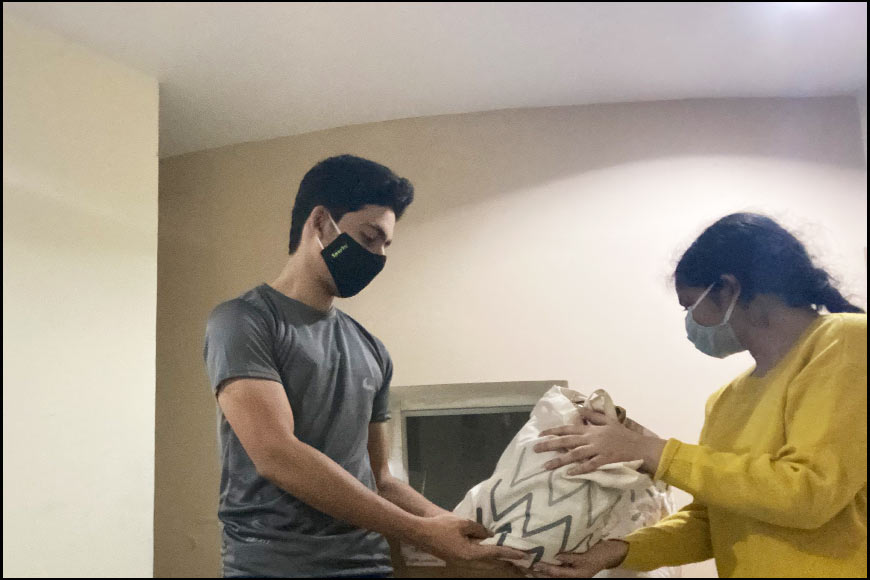 Project Amara
Project Amara
She got in touch with various NGOs across the country and they helped her to popularize the concept, distribution and donation. “We are still deciding whether we should centralize the dis-tribution in Bengal or spread it across the country. We are still collecting clothes. We will start educational and awareness sessions as well as distribution from April,” she said.
In future, for acquiring the cloth-pads, the team plans to collaborate with some organization who employ rural women, who can stitch them. “I am planning to contact organizations like Pee-safe, FabPad, etc who can manufacture the pads and then we will distribute them to women,” she said.
Pandemic opened up new vistas for many women and potential in women, help build a menstrual connect between urban-rural women who brought out themselves as new avatars in themselves.
While Pragya unravelled the truth behind menstruation, how it is linked with reproduction and details of menstrual health and hygiene, Ivaana is walking on the same path to empower women and offer them a sustainable solution for menstrual health. Going beyond sanitary napkins, new concepts of ‘cloth pads’ and ‘menstrual cups’ are being introduced to the rural folks.






